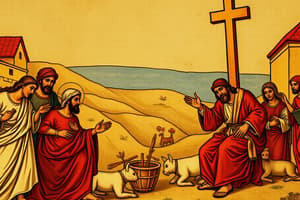Podcast
Questions and Answers
In what century did Christianity emerge?
In what century did Christianity emerge?
- 1st century AD (correct)
- 2nd century AD
- 4th century AD
- 3rd century AD
What was the main outcome of the First Council of Nicaea?
What was the main outcome of the First Council of Nicaea?
- The establishment of the Pope as the head of the Church
- The affirmation of Jesus as fully divine (correct)
- The declaration of Mary as the Mother of God
- The rejection of the divinity of the Holy Spirit
What was the main controversy during the Byzantine Era?
What was the main controversy during the Byzantine Era?
- The use of icons in worship (correct)
- The authority of the Patriarch of Constantinople
- The two natures of Christ
- The divinity of the Holy Spirit
What was the result of the Ottoman Era for the Orthodox Church?
What was the result of the Ottoman Era for the Orthodox Church?
Who was a key figure in the Orthodox Church during the Byzantine Era?
Who was a key figure in the Orthodox Church during the Byzantine Era?
What is the process of becoming united with God through deification?
What is the process of becoming united with God through deification?
What was the main issue of contention between Eastern and Western Christianity?
What was the main issue of contention between Eastern and Western Christianity?
What is the practice of contemplative prayer and inner stillness?
What is the practice of contemplative prayer and inner stillness?
Flashcards are hidden until you start studying
Study Notes
Early Christianity (1st-5th centuries)
- Christianity emerged in the 1st century AD, founded by Jesus Christ and his apostles
- Spread throughout the Mediterranean world, with key centers in Jerusalem, Antioch, and Alexandria
- Early Christian communities faced persecution, particularly under Roman Emperor Diocletian (303-313 AD)
Ecumenical Councils (4th-8th centuries)
- Series of seven councils that established Orthodox doctrine and practice
- First Council of Nicaea (325 AD): established the Nicene Creed, affirmed Jesus as fully divine
- First Council of Constantinople (381 AD): affirmed the divinity of the Holy Spirit
- Council of Ephesus (431 AD): affirmed Mary as Theotokos (Mother of God)
- Council of Chalcedon (451 AD): established the two natures of Christ (human and divine)
Byzantine Era (5th-15th centuries)
- Orthodox Church became the official state church of the Byzantine Empire
- Period of significant theological and liturgical development
- Iconoclastic Controversy (726-843 AD): debate over the use of icons in worship
- Photian Schism (866-879 AD): dispute over the patriarchate of Constantinople
Ottoman Era (14th-20th centuries)
- Orthodox Church faced persecution and decline under Ottoman rule
- Patriarchate of Constantinople became the spiritual center of the Orthodox Church
- National churches emerged in Eastern Europe, such as the Russian Orthodox Church
Modern Era (20th-21st centuries)
- Orthodox Church faced significant challenges, including communist persecution and secularization
- Ecumenical movement and dialogue with other Christian denominations
- Autocephalous churches established in Eastern Europe and the Americas
Key Figures
- Apostles: Peter, Paul, John, and others
- Church Fathers: Athanasius, Basil, Gregory of Nazianzus, and John Chrysostom
- Patriarchs: Photios, Cyril Lukaris, and Meletios IV
- Saints: Nicholas of Myra, John of Damascus, and Mary of Egypt
Key Concepts
- Theosis: the process of becoming united with God through deification
- Filioque: the addition of "and the Son" to the Nicene Creed, a point of controversy with Western Christianity
- Hesychasm: the practice of contemplative prayer and inner stillness
Early Christianity (1st-5th centuries)
- Christianity was founded by Jesus Christ and his apostles in the 1st century AD
- The religion spread throughout the Mediterranean world, with key centers emerging in Jerusalem, Antioch, and Alexandria
- Early Christian communities faced severe persecution, particularly under Roman Emperor Diocletian from 303-313 AD
Ecumenical Councils (4th-8th centuries)
- A series of seven councils were held to establish Orthodox doctrine and practice
- The First Council of Nicaea (325 AD) established the Nicene Creed, affirming Jesus as fully divine
- The First Council of Constantinople (381 AD) affirmed the divinity of the Holy Spirit
- The Council of Ephesus (431 AD) affirmed Mary as Theotokos (Mother of God)
- The Council of Chalcedon (451 AD) established the two natures of Christ (human and divine)
Byzantine Era (5th-15th centuries)
- The Orthodox Church became the official state church of the Byzantine Empire
- This period saw significant theological and liturgical development
- The Iconoclastic Controversy (726-843 AD) was a debate over the use of icons in worship
- The Photian Schism (866-879 AD) was a dispute over the patriarchate of Constantinople
Ottoman Era (14th-20th centuries)
- The Orthodox Church faced persecution and decline under Ottoman rule
- The Patriarchate of Constantinople became the spiritual center of the Orthodox Church
- National churches emerged in Eastern Europe, such as the Russian Orthodox Church
Modern Era (20th-21st centuries)
- The Orthodox Church faced significant challenges, including communist persecution and secularization
- There was an ecumenical movement and dialogue with other Christian denominations
- Autocephalous churches were established in Eastern Europe and the Americas
Key Figures
- Apostles: Peter, Paul, John, and others played a crucial role in spreading Christianity
- Church Fathers: Athanasius, Basil, Gregory of Nazianzus, and John Chrysostom were influential in shaping Orthodox theology
- Patriarchs: Photios, Cyril Lukaris, and Meletios IV held significant positions in the Orthodox Church
- Saints: Nicholas of Myra, John of Damascus, and Mary of Egypt were venerated for their piety and devotion
Key Concepts
- Theosis refers to the process of becoming united with God through deification
- Filioque is the addition of "and the Son" to the Nicene Creed, a point of controversy with Western Christianity
- Hesychasm is the practice of contemplative prayer and inner stillness
Studying That Suits You
Use AI to generate personalized quizzes and flashcards to suit your learning preferences.



